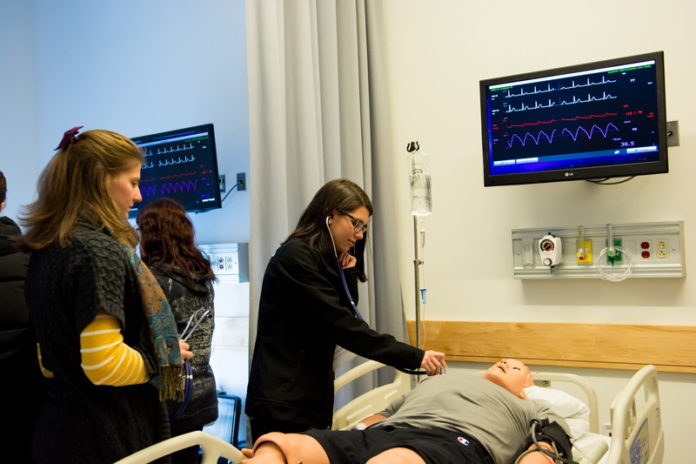
When Zoe Schwartz entered high school she was intimidated by technology classes because she believed they were just for boys.
But as a sophomore she joined anyway and with a little guidance from one of her teachers, Schwartz – along with the only two other girls in her class – started building robots that were three times the size of those built by her male counterparts.
“As girls, we felt the need to counterbalance the boys’ constant offers to do our work for us,” Schwartz wrote in a recent essay competition with the National Center for Women & Information Technology.
Schwartz has been among the hundreds of high school girls who each year participate in the Tech Collective GRRL Tech Interactive Technology Expo at the University of Rhode Island.
The event, held this year on March 19, is to raise awareness among regional high school girls and give them an opportunity to participate in a slew of different workshops dedicated to the fields of science, technology, engineering and mathematics – popularly referred to as STEM.
“It’s great,” said Brianne Neptin, coordinator of coastal and environmental fellowship programs at URI.
Neptin collaborates with Tech Collective, professionals from the different industries and scholars from the university to put the workshops together.
“It opens their eyes a little bit,” she added.
Schwartz, about to graduate from Smithfield High School, has noticed a repeating trend of how boys are inherently viewed as more capable in the fields of technology and engineering. And her experience is all too common, especially in the field of technology, where women in the workforce are scarce.
In 2013, women held 57 percent of professional occupations in the U.S. workforce, but just 26 percent of professional computing occupations, according to a study done by the National Center for Women & Information Technology.
The underrepresentation is reflected in the U.S. education system, where 56 percent of Advanced Placement test-takers in 2013 were female, but just 19 percent of the computer science Advanced Placement test-takers were female, according to the study.
The numbers are even lower among minorities. Of the 26 percent of women in the computing workforce, just 3 percent were African-American, 5 percent were Asian and 2 percent were Hispanic.
The numbers are particularly alarming because the study projects there will be 1.2 million computer-related jobs opening in the U.S. by 2022.
The tech industry is one of the most lucrative industries with one of the narrowest gender pay gaps, according to a recent study conducted by Fast Company magazine.
Women receive 89 percent and 90 percent of what men are paid in the fields of computer science and computer programming, respectively. By comparison, women get paid just 71 percent and 66 percent of men’s wages in the fields of physicians/surgeons and finance specialists, respectively.
Schwartz has noticed there just aren’t that many women in the field. Indeed, just 7 percent of tech companies were founded by women, according to Fast Company. In 2012, just 24 percent of chief information officers at Fortune 100 companies were women.
JoAnn Johnson, manager of youth and education programs at Tech Collective, says part of it is that there’s a lack of female role models in the field.
“We could always do more to make more girls aware,” Johnson said.
More than 500 students and 47 educators showed up to this year’s GRRL Tech Interactive expo. The 25 workshops offered are designed and conducted by female industry professionals and college faculty. When the expo first began, it was specifically tailored to just technology, but with mounting popularity, organizers expanded it to incorporate all of STEM.
Schwartz attended GRRL Tech last year and would like to study engineering in college. But she also wants to continue to advocate for other girls to get involved and start a new gender trend in these growing and lucrative industries.
“I would love to start a robotics club at the local elementary school and encourage as many girls as I can,” said Schwartz, whose essay earned her the NCWIT Award for Aspiration in Computing. •












